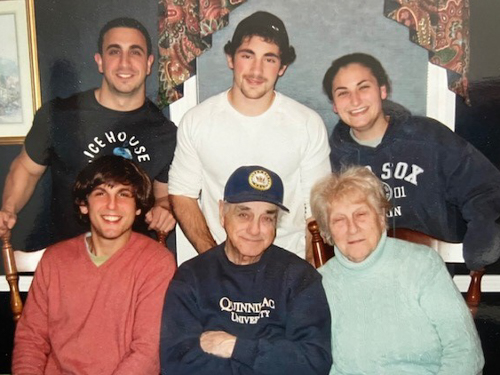How can we help?
888-283-1722
Call us now at 888-283-1722
24/7 Referrals and Nursing Support
Voices of Care Blog

Fewer Medications May Help Hospice Patients’ Quality of Life
Posted on July 18, 2023 by Allyson Beechy, PharmDMany people believe that if they choose hospice, they must give up all their medications in favor of comfort medications.
The truth is medications are tailored to each hospice patient’s needs. At Care Dimensions, that starts with a medication review.
This review ensures that patients are receiving the best combination of medications and therapies for their needs, goals, and quality of life. Some hospice patients may remain on all their medications, while others may choose to stop taking certain medications that are no longer beneficial or cause harm. Decisions are always made collaboratively with the patient, family, hospice staff, and the patient’s doctor.
Studies show that taking more than five medications daily increases the risk of adverse interactions, side effects, and medication errors. As we age and our health changes, medications tend to be added to treat certain conditions or symptoms but may not be reevaluated for their safety and necessity.
Some common reasons why patients may choose to discontinue certain medications while on hospice care include:
1) Changes in body composition and function
Older adults may require lower doses of medications to achieve the same effect or to prevent side effects and organ damage. Examples of physical changes and their effects include:
- Reduced kidney function with medication buildup.
- More fat cells, which can absorb more of some medications.
- Bone loss. Patients with weakened bones who take medications that may cause dizziness have an increased risk of falling and fractures.
2) Benefits of a medication review
Before starting hospice, patients may see multiple doctors for different conditions, and each prescriber may not have a full list of the patient’s medications to assess safety before prescribing a new medication. Many patients also take over-the-counter medications, vitamins, and supplements that may not show up in medical records. Some doctors may hesitate changing drugs prescribed by another doctor, which can result in a buildup of medications. The hospice team can review all prescription, non-prescription, vitamin, and supplement medications and advise the patient and caregiver so they may decide whether to change their medication routine.
3) Comfort and quality of life
It is important for patients and their caregivers to understand that certain medications may not lead to the best quality of life. Discussions around discontinuing them may help patients manage symptoms. For example:
- Statins are commonly known for lowering cholesterol. Doctors often emphasize the importance of taking statins with “baby aspirin” as a possible way to prevent heart disease, heart attacks, or strokes. These preventive medications may no longer provide enough benefit to outweigh their potential risks for hospice patients.
- Blood pressure and blood sugar lowering medications are designed to prevent organ damage over time. High blood pressure or blood sugar levels for a short period would not likely cause significant organ damage. Hospice patients tend to eat and drink less, so they are more prone to low blood sugar and low blood pressure and may no longer benefit from blood pressure and diabetic medications.
- Vitamins and supplements are commonly used with a normal diet for maintaining and improving health and are usually safe if used under a doctor’s supervision. When patients are no longer able to eat full meals and perform daily activities, these vitamins and supplements may no longer be beneficial.
4) Pill burden
Many patients approaching end of life have difficulty swallowing. The hospice team’s goal is to ensure the patient receives the biggest benefit from the fewest medications. The team can talk with the patient and caregiver about which of their current medications may not be clinically beneficial.
The patient’s and caregiver’s understanding and comfort with all decisions is key to quality hospice care. Choosing to stop a certain medication may improve a hospice patient’s quality of life, but that decision can be made only after careful consideration by the patient and care team.
View other caregiver support resources.
To be notified when articles are published on the Care Dimensions blog, please email [email protected].
About the author
Allyson Beechy, PharmD., has been working with Care Dimensions through a partnership with the Dana-Farber Cancer Institute/Harvard Interprofessional Palliative Care Fellowship Program.
Additional Posts
Honoring Caregivers, Offering Support on National Caregivers Day
Posted on February 20, 2025 by Lisa Conti in CaregivingThe need for caregivers is increasing as the population ages and more people are diagnosed with dementia. The free Dementia GUIDE Program can help. ...
Continue readingHospice Brings Comfort and Eases Anxiety for Grandmother and Family
Posted on May 30, 2024 by Alison Samia in Caregiving, HospiceWhen brought on to hospice early, patients and their families can fully benefit from services that are available to them. A granddaughter recounts how they found Care Dimensions, and how much of a difference our team was able to make. ...
Continue reading'Hardest Thing I Ever Did': Veteran of 3 Wars Reflects on Caring for his Dying Wife
Posted on July 25, 2023 by Lisa Conti in CaregivingA retired Army sergeant major recalls how a Care Dimensions hospice team helped him ensure that his wife could be cared for at home, be comfortable, and die peacefully. ...
Continue readingAnyone—patient, family, care provider—can make a referral. Fill in the form online or call us today.
Since 1978, Care Dimensions, formerly Hospice of the North Shore, has provided comprehensive and compassionate care for individuals and families dealing with life-threatening illnesses. As the non-profit leader in advanced illness care, we offer services in over 100 communities in Massachusetts.
Copyright 2026 | Care Dimensions, 75 Sylvan Street, Suite B-102, Danvers, MA 01923 | 888-283-1722 | 978-774-7566 |









